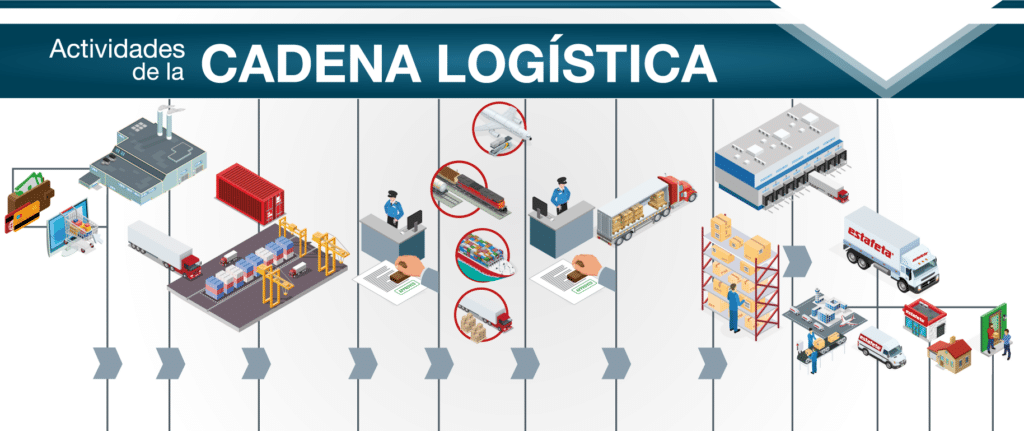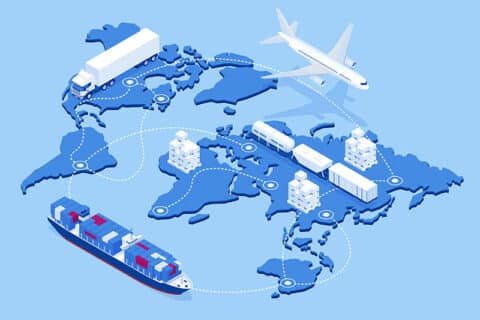In today’s digital age, the evolution of supply chains has become a vital component in meeting rising consumer expectations. From optimizing the user experience to implementing personalized strategies, companies are exploring new ways to save time and resources while improving supply chain efficiency. This in-depth analysis will explore the emerging trends, key strategies and relevant keywords that are shaping the evolution of supply chains.
In today’s dynamic digital landscape, the transformation of shipping chains stands as an essential pillar to meet growing consumer expectations. Beyond simply delivering products, companies are engaged in a journey of user experience optimization and strategic implementation to achieve unprecedented levels of supply chain efficiency. In this in-depth analysis, we will explore the emerging currents, key strategies and essential elements that are shaping the evolution of shipping chains towards new horizons of efficiency and service. Get ready to dive into this fascinating journey of logistics innovation!
In the contemporary digital age, the revolution in education is fundamentally transforming the way we acquire and share knowledge. From online platforms that offer specialized courses to emerging technologies such as virtual reality that create immersive learning environments, the educational landscape has expanded beyond the traditional classroom. This in-depth analysis will examine the innovative trends, key educational strategies and disruptive technology tools that are shaping the future of digital education.
In the context of today’s digital revolution, the evolution in how organizations manage talent has become critical to business success. From the implementation of talent management platforms to the adoption of more flexible and customized approaches, talent management strategies are undergoing significant transformation. This in-depth analysis will explore the emerging trends, best practices and key technologies that are defining the evolution of talent management in the digital age. Get ready to dive into this exciting journey into the future of leadership and organizational excellence!
Last Mile Specialized Expertise:
Technology in the Last Mile: Focusing on specialized last mile expertise is essential to meeting consumer expectations. Implementing technologies such as drone and robotic delivery improves efficiency and shortens delivery times, providing a unique experience.
Real-Time Tracking: Transparency has become crucial. The ability to track in real time the status of shipments not only provides confidence to the customer, but also allows for real-time adjustments to address potential issues.
Sustainable Packaging and User Experience: Sustainable packaging not only contributes to environmental responsibility, but also enhances the user experience. Companies that adopt green packaging practices earn extra points in customer perception.
Efficient inventory management has become critical in the evolution of supply chains. Companies are looking to implement advanced systems that use technologies such as the Internet of Things (IoT) to monitor the quantity and location of products in real time. This improved visibility not only reduces costs by avoiding inventory overages or shortages, but also optimizes speed and accuracy in the supply chain, providing a more seamless experience for customers and businesses.
Personalized Strategies and Segmentation:
Personalization in Shipment Selection: Offering personalized options in shipment selection, such as specific delivery times or the ability to choose between fast and economy shipments, allows customers to tailor the experience according to their needs.
Preference-based segmentation: Preference-based segmentation involves understanding individual customer preferences and tailoring shipping strategies accordingly. From carrier choice to delivery options, segmentation improves customer satisfaction.
Personalized Loyalty Programs: Implementing personalized loyalty programs in shipping chains not only rewards customer loyalty, but also provides valuable data that can be used to further tailor strategies.
Automation is an essential pillar in the evolution of global supply chains. The implementation of automated systems, from warehouse management to delivery route planning, not only speeds up logistics processes, but also ensures greater accuracy and efficiency in international operations. The ability to adapt quickly to fluctuating demand and the complexities of global markets makes all the difference in a world where agility and speed are imperative.
Time and Resource Savings:
Automation in Inventory Management: Automation in inventory management saves time and reduces errors. The implementation of advanced systems ensures that inventory levels remain efficient, avoiding delays and optimizing the supply chain.
Predictive logistics: Predictive logistics uses data analytics to forecast demand patterns and adjust the supply chain accordingly. This approach not only saves time but also optimizes resources by preventing overages or shortages.
Smart Warehouse Technology: The introduction of smart warehouse technology, such as warehouse robots and advanced management systems, not only increases processing speed but also optimizes the use of space and resources.
Integrating sustainable practices into supply chains is becoming an imperative in today’s era. Companies are looking to reduce their environmental footprint by using eco-friendly packaging, optimizing routes to minimize emissions and choosing more sustainable transportation options. Sustainability is not only presented as a corporate responsibility, but also as a key differentiator in consumer preference, leading to an evolution towards more ethical and environmentally friendly practices in supply chain management.
Relevant Keywords:
Agile Supply Chain Last Mile Efficient Real-Time Tracking Predictive Logistics Predictive Logistics Sustainable Packaging Inventory Automation Warehouse Technology User Experience Logistics.
In the complex web of modern logistics, supply chain agility, last mile efficiency and real-time tracking intertwine to create a dynamic operations fabric. Predictive logistics steers the helm, while sustainable packaging and inventory automation set the compass for the future. Warehouse technology, user experience and innovative management strategies achieve precise harmony in this constantly evolving landscape. Join us on this logistics journey, where we will explore the keys to unlocking excellence in the 21st century supply chain. Get ready to discover the trends that are transforming today’s logistics landscape!
Automation and Robotics in the Supply Chain:
Robots in Warehouses: The introduction of robots in warehouses has revolutionized the supply chain. From product sorting to packaging, robots streamline operations, reduce labor costs and minimize errors.
Drones for Rapid Delivery: The use of drones for rapid delivery is gaining ground. This not only shortens delivery times, but also opens up new possibilities to reach remote areas efficiently.
Artificial Intelligence in Route Management: Artificial intelligence (AI) is used to optimize route management. Advanced algorithms can analyze real-time data to find the most efficient routes, saving time and fuel.
Advances in payment and tracking systems have transformed the supply chain into an interconnected and transparent network. The implementation of technologies such as blockchain enables secure and verifiable transactions, providing stakeholders with real-time visibility into product movements. In addition, the digitization of payment systems streamlines financial transactions, reducing associated times and costs. This integrated approach not only improves efficiency in the supply chain, but also strengthens trust among participants by providing an immutable and transparent record of each step in the process.
Sustainability and Green Supply Chain:
Electric Vehicles and Renewable Energy: The adoption of electric vehicles and the integration of renewable energy sources into the supply chain are significant steps towards sustainability. This not only reduces the carbon footprint but also aligns with consumers’ environmental expectations.
Eco-friendly packaging: Eco-friendly packaging strategies are not only sustainable, but also respond to consumers’ growing environmental awareness. Using recyclable materials and reducing packaging waste are key practices.
Efficient Reverse Logistics: Reverse logistics, efficiently managing the return of products, is essential for a sustainable supply chain. Reuse of products and materials contributes to the circular economy.
Resilience has become a crucial component in the evolution of supply chains. Companies are looking to build systems that can adapt to unforeseen situations, such as global crises, natural disasters or supply chain disruptions. Strategies such as supplier diversification, decentralized warehousing and the use of advanced technologies for real-time monitoring are at the heart of efforts to strengthen resilience. These measures not only enable unexpected challenges, but also prepare supply chains to thrive in a dynamic and changing business environment.
Additional Keywords:
Robotics in Logistics Delivery Drones Artificial Intelligence in Supply Chain Artificial Intelligence in Supply Chain Sustainable Supply Chain Reverse Logistics Energy Efficiency in Logistics Warehouse Innovation Emerging Technologies in Supply Chain.
Challenges and Overcoming:
Data Security and Privacy: With the increasing reliance on advanced technologies, data security and privacy become critical concerns. Companies must address these challenges to build customer trust.
Resistance to Workforce Change: The adoption of advanced technologies can encounter resistance in the workforce. Training and change management are critical to overcoming this challenge.
Initial Implementation Costs: The initial investment in emerging technologies can be substantial. Companies must carefully evaluate the long-term costs and benefits to ensure a successful implementation.
Cultural transformation presents itself as both a challenge and an opportunity as companies evolve toward more efficient and adaptive supply chains. The adoption of new technologies and practices requires a change in mindset and organizational culture. Successful companies are investing in the training and development of their teams, fostering a mindset geared towards innovation and adaptability. This approach not only overcomes the challenge of resistance to change, but also establishes solid foundations for continuous evolution in an ever-changing business environment.
Future of Supply Chains:
The future of shipping chains looks exciting, driven by continuous innovation and the adoption of cutting-edge technologies. From drone delivery to efficient reverse logistics, companies that embrace these changes will not only improve the user experience, but also lead the way to more efficient and sustainable supply chains.
The evolution of shipping chains is a dynamic journey that drives not only operational efficiency but also customer satisfaction. By adopting specialized, customized and sustainable strategies, companies can not only respond to current market demands, but also anticipate and lead the future of supply chains in the digital age. Adaptability and the constant pursuit of innovation will be the drivers that guide companies to success in this exciting logistics transformation journey.
The field of artificial intelligence (AI) in healthcare is undergoing a revolutionary transformation, redefining healthcare delivery and improving outcomes for patients around the world. From more accurate diagnoses to personalized treatments, AI is playing a crucial role in advancing medicine. As technologies evolve and integrate into healthcare systems, new opportunities are opening up to improve the efficiency, accessibility and quality of care. This ever-changing landscape promises an exciting future where AI and healthcare converge to deliver impactful outcomes.
Cultivate a Continuous Improvement Mindset: Continuous improvement is essential in modernizing delivery chains. Foster an organizational culture that values innovation and the constant search for ways to optimize processes and services.
Explore Strategic Alliances: Collaboration and strategic alliances can be key to modernization. Explore opportunities to partner with other companies or services that complement and strengthen your supply chain.
Don’t Underestimate the Importance of Reverse Logistics: Efficient reverse logistics management is just as crucial as traditional logistics. Pay attention to your return processes and consider how you can make them more efficient and sustainable.
Measure Sustainability Impact: Sustainability is not only an ethical issue, but also a smart business strategy. Measure and clearly communicate the environmental impact of your logistics practices, demonstrating a real commitment to social responsibility.
Learn from Customer Feedback: Customer feedback is a valuable tool. Actively listen to your customers to understand their needs and expectations, and use it as input to continually adjust and improve your logistics operations.
Evaluate Return on Investment (ROI): Before making significant investments, carefully evaluate the expected return on investment. Make sure that new technologies or strategies not only improve efficiency, but also have a positive impact on profitability.
Anticipate Future Challenges: While it is important to address current challenges, it is also crucial to anticipate future challenges. Stay on top of emerging trends and potential market disruptions so that you are prepared to face any obstacles.
Flexibility is Key in a Changing World: We live in a dynamic world where conditions and demands can change rapidly. Design your supply chain with the flexibility to adapt to unexpected changes or new market opportunities.
Promote Corporate Social Responsibility: Corporate social responsibility (CSR) is an increasingly important component for consumers. Highlight your CSR efforts in the supply chain, showing a genuine commitment to ethical and sustainable practices.
Celebrate Successes and Learn from Failures: Celebrate successes and learn from failures. Recognize and reward achievements in supply chain modernization, and use mistakes as learning opportunities to refine your strategies.
In conclusion, modernizing supply chains is an ongoing journey that requires constant attention to innovation, efficiency and customer satisfaction. With a strategic approach and a mindset of continuous improvement, companies can build supply chains that are not only adaptable to today’s challenges, but also prepared to lead in a changing future.
Tips for Modernizing Supply Chains:
Adopt Emerging Technologies Gradually: You don’t need to implement all technologies at once. Start adopting emerging technologies gradually and evaluate how they positively impact efficiency and customer experience.
Prioritize User Experience: Focus on improving the user experience at every stage of the shipping chain. From checkout to delivery, customer satisfaction should be the primary consideration.
Invest in Tracking and Transparency: Real-time tracking and transparency in shipping operations are key. Customers value the ability to know the exact status of their packages and anticipate potential problems.
Implement Sustainable Packaging Strategies: Contributing to environmental sustainability is not only beneficial for the planet, but also improves brand perception. Adopt sustainable packaging strategies and communicate these efforts to your customers.
Customize Shipping Options: Provide customized shipping options, such as flexible delivery times or fast and cost-effective services. Personalization increases customer satisfaction and fosters brand loyalty.
Train Your Workforce on New Technologies: Resistance to change can arise among the workforce when implementing new technologies. Be sure to provide adequate training and communicate the benefits to both the company and employees.
Continually Evaluate Performance: Establish key performance metrics and continually assess how new strategies and technologies impact efficiency, costs and customer satisfaction. Adjust your approaches based on results.
Stay Current with Market Trends: Technology is constantly evolving. Stay informed about market trends and innovations in logistics to ensure you are always one step ahead in optimizing your supply chains.
Foster Collaboration with Suppliers and Partners: Work closely with suppliers and logistics partners. Collaboration can lead to more integrated and efficient solutions that benefit all parties involved in the supply chain.
Anticipate and Adapt to Customer Needs: Stay attuned to changing customer expectations and market trends. The ability to anticipate and adapt quickly to customer needs will allow you to maintain a competitive advantage.
By following these tips, you can not only modernize your shipping chains, but also build a more efficient, customer-centric logistics operation. Adaptability and constant attention to improvement are key to continued success in an ever-changing business environment.





